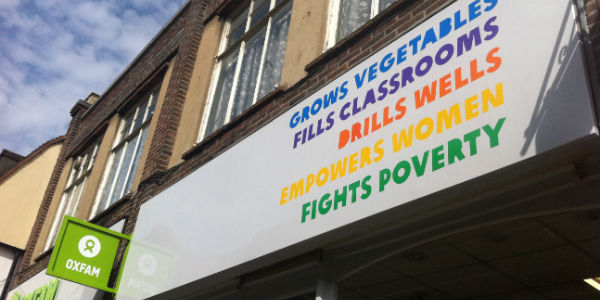How is Oxfam being held accountable over the Haiti scandal?
In February 2018, The Times newspaper revealed that Oxfam employees had been accused of sexual exploitation in Haiti. This event sparked a series of other reports about misconduct within major charities, which in turn raised serious questions about accountability in the NGO sector. Domenico Carolei looks at whether the systems of accountability that apply to British NGOs and charities working in poor countries are adequate and comprehensive. And he considers the voices still missing: those of the victims.

Oxfam shop sign. Picture: Howard Lake, via (CC BY-SA 2.0)
So far 2018 seems to be a turbulent year for British charities. The nomination of Baroness Tina Stowell as new Chair of the Charity Commission has spread concerns within components of organised civil society over the lack of a politically neutral appointment, because of her longstanding parliamentary carrier as a member of the Conservative party. The former minister for civil society Rob Wilson has, in turn, openly criticised charities for being overtly pro-left, warning about the current process of ‘Corbynisation’ of the third-sector. More dramatically, an investigation carried out by the Financial Times revealed that hostesses were groped, sexually harassed and propositioned during a men-only fundraising dinner organised by the London-based charity the Presidents Club.
But by far the most important development has been the scandal involving Oxfam’s misconduct in Haiti, along with several similar cases that emerged in the aftermath. In February, The Times revealed that senior Oxfam staff in Haiti had allegedly paid earthquake survivors for sex in 2011, citing a confidential internal report by Oxfam, which referred to a ‘culture of impunity’ spread among aid workers. According to the newspaper, Oxfam did not tell other aid agencies about the misconduct of staff members, which allowed them to work elsewhere, and, similarly, it failed to report the abuse to the Haitian authorities. Further allegations of abuse and misconduct later spread to other charities, including Save the Children and Bono’s One charity.
The original scandal had an immediate impact on the multiple stakeholders to whom Oxfam should report its actions. Media account of the scandal triggered different public and private reactions, all of which are contributing, to different extents, to the accountability narrative of this story. I consider here how Oxfam is currently facing multiple accountability demands, and how this relates to the general accountability of NGOs and charities.
The Charity Commission – institutional accountability
By exercising its function of taking enforcement actions in case of charity malpractice, the Charity Commission has opened a statutory inquiry into Oxfam – because the latter ‘may not have fully and frankly disclosed material details about the allegations at the time in 2011, its handling of the incidents since, and the impact that these have both had on public trust and confidence’. Among the various external stakeholders, charity regulators hold associations accountable by exercising supervisory and investigative functions aimed at verifying compliance with charity law as well as by investigating wrongdoing within the sector. Institutional watchdogs and regulatory bodies may exercise a significant degree of accountability over charities by granting or revoking charity status, and by issuing disciplinary sanctions in cases of misconduct.
Donors – financial accountability
Just like regulatory bodies, donors exercise considerable leverage and ability to call NGOs to account, because of their financial power. In general, big donors tend to shape the way in which projects are implemented on the ground by withdrawing funding if their expectations are not met. It is also empirically proven that scandals involving charities lead cyclically to low-stakeholder trust which, in turn, causes a decrease of donations. Indeed, the BBC has reported that more than 1,200 private donors cancelled their direct debits three days after the Oxfam’s investigation was published by The Times. Marks & Spencer – a £16m donor for Oxfam since 2008 – will soon decide on withdrawing financial support. And the Duke of Edinburgh’s Award is considering whether it should allow children to volunteer in Oxfam shops (according to The Times). Voluntary work is vitally important for a charity and any loss in that respect would negatively impact a charity’s financial health. As for institutional donors, Oxfam could potentially lose £29m of European Union funding. And last year it received £31.7m in UK government funding, which has also been put seriously at risk. Additionally, actress Minnie Driver has stood down from her role as a celebrity ambassador for Oxfam.
Inter-organisational reaction – peer accountability
Charities can also be held accountable, at sectoral level, by their peers. Peer pressure is often exercised to condemn negligent organisational behaviour, especially in the aftermath of a scandal. Public scandals can quite easily have adverse effects on the credibility of the entire third sector, even if allegations of misconduct concern a small number or even just one organisation. So peer accountability is a strategically important means to preserve and restore the long term reputation of the sector. In this specific instance, BOND – the umbrella body for international aid NGOs – condemned in peremptory terms the behaviour of Oxfam employees. And the National Council for Voluntary Organisations (NCVO) has emphasised that ‘more can and must be done’ to minimise the risk of abuse taking place.
On a wider front, ChristianAid said that it had investigated two sexual misconduct cases last year: ‘One investigation led to the dismissal of a staff member, while the other case resulted in disciplinary action.’ In a similar vein, ActionAid emphasised its zero-tolerance policy on any form of sexual harassment. The Scottish aid charity the Scottish Catholic International Aid Fund also insisted it can be trusted, after it acknowledged two misconduct cases in Africa, which involved a volunteer from a local partner organisation and a junior staff member respectively.
Intra-organisational accountability – self-regulation and organisational policies
An internal dimension of the accountability process takes place at the within organisational level among staff involved in the charity’s governance and administration. The core expectation is that charities will learn from their mistakes and implement organisational changes so as to improve their future accountability performance. In the immediate aftermath of the report, two things happened at an organisational level. Firstly, Oxfam’s deputy chief executive resigned and took full responsibility for the wrongdoing, admitting that Oxfam had failed to act adequately upon concerns that had been raised. Secondly, the NGO announced a package of measures to improve safeguards and organisational performance, including: a) staff induction and mandatory training to ensure staff learn more about organisational values and code of conduct; b) the establishment of a new, independent, external whistleblowing helpline for staff members; c) strengthening the vetting and recruitment of staff; d) a commitment to work with the rest of the sector to overcome legal difficulties, which have prevented NGOs from sharing intelligence amongst themselves.
Criminal accountability – criminal prosecution
Aside from these well-recognised dimension of accountability, there is also the potential criminal liability which rests with those individuals who allegedly perpetrated the abuse. To date, no criminal investigation has been launched and in theory, as a matter of territorial jurisdiction, sexual abuse should be prosecuted by Haitian authorities. However, Andrew MacLeod (former chief of operations of the UN Emergency Coordination Centre) has clarified that: ‘if they [victims] were adults, perpetrators should be charged in front of the courts in Haiti because prostitution is illegal. If they are children, they should be charged in front of UK courts for breaking international sex tourism laws’. The UK International Development Secretary is to meet the National Crime Agency over the Oxfam scandal.
Concluding remarks: part of the problem or the whole problem?
Oxfam is facing overlapping demands for accountability formulated by different stakeholders, each of which is exercising a pressure upon and within the organisation: donors, regulators, media, umbrella bodies, peers, volunteers, and Oxfam’s employees and managers. The accountability narrative would be completed if the views of the victims are taken into account: those people on whose behalf Oxfam claim to be working with and for. For any NGO, surely it is its beneficiaries who represent the most important source of organisational legitimacy.
The Haiti scandal is dramatic for many aspects but there is a fundamental matter that the sector needs to address urgently: if NGOs are failing to protect communities they work with from harm and abuse, can we seriously believe that charities are contributing to the empowerment of these communities? According to UN figures (from 2017), 2.5 million Haitians are still dependent on humanitarian aid and there are tens of thousands of Haitians living in temporary shelters eight years after the earthquake. From this perspective, NGOs might appear to be part of the problem rather than the solution. The Haiti scandal, however, revealed something more insidious that goes well-beyond the lack of financial transparency and poor-organisational performance in terms of service delivery: the benevolent protector transformed into a sexual abuser. In such a case, the Oxfam staff in Haiti were not simply a part of the problem but, rather, accentuated and enacted the problem.
This article represents the views of the author and not those of Democratic Audit. An earlier version of this post appeared on the University of Aberdeen’s School of Law blog.
About the author
 Domenico Carolei is a PhD Candidate at the School of Law, University of Aberdeen and lawyer (Italian Bar Association).
Domenico Carolei is a PhD Candidate at the School of Law, University of Aberdeen and lawyer (Italian Bar Association).





 Democratic Audit's core funding is provided by the Joseph Rowntree Charitable Trust. Additional funding is provided by the London School of Economics.
Democratic Audit's core funding is provided by the Joseph Rowntree Charitable Trust. Additional funding is provided by the London School of Economics.